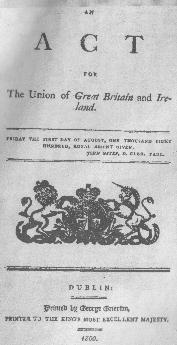The Act of Union after 200 years
 JUST
IN CASE anyone missed it, January 1st 2001 was
the bicentennial anniversary of the Act of Union between Great Britain and
Ireland; that is, the foundation of the United Kingdom and the current version
of the Union Jack. Great celebrations all round then? Well, er…, no!
There were no commemorative stamps and coins, not even a tea
towel! What about celebrations? No. We have heard more about the 100th
anniversary of the federation of Australia and the twentieth anniversary of the
IRA hunger strikes than we have about the Act of Union.
JUST
IN CASE anyone missed it, January 1st 2001 was
the bicentennial anniversary of the Act of Union between Great Britain and
Ireland; that is, the foundation of the United Kingdom and the current version
of the Union Jack. Great celebrations all round then? Well, er…, no!
There were no commemorative stamps and coins, not even a tea
towel! What about celebrations? No. We have heard more about the 100th
anniversary of the federation of Australia and the twentieth anniversary of the
IRA hunger strikes than we have about the Act of Union.
Unionists are supposed to cherish the Union above all else. Were there UUP or DUP motions proposed at the Assembly, Westminster and local councils recognising the anniversary? There were none that we have seen. Where were the unionists? Perhaps their hearts weren’t really in it and they couldn’t even go through the motions of pretending that the Union is all but dead and beyond resurrection.
The Union of the British and Irish parliaments came in the aftermath of the defeat of the great 1798 Rebellion. William Pitt, the Prime Minister, sought to bring internal peace and good government to Ireland and to get rid of the old corrupt Anglican Ascendancy parliament on College Green, but it didn’t quite work out that way. The British establishment blew their chances by dragging their feet on Catholic emancipation. Irish disaffection with the Union, especially after the famine years of the 1840s, led to the growth of a new spirit of nationalism. Catholic and Gaelic Ireland wanted the repeal of the Union and ‘home rule’, which was eventually granted when the Irish Free State came into being in December 1921.
In Ulster, things were different. Many Presbyterian former United Irishmen came to see that the Union had righted some of the wrongs they had joined the ’98 Rebellion to put right. Ulster began to prosper commercially and industrially under the Union. Henry Cooke, a prominent unionist Presbyterian, even pronounced the banns of marriage between Presbyterians and Anglicans in defence of the Union. This Protestant support for the Union continues today.
However, the Union is not what it was. The British Empire – for good or ill - is long gone. Successive British governments have divested themselves of most of Britain’s overseas colonies. Significantly, the prevailing attitude among the British establishment is not that Ulster is a cherished and equal part of the Kingdom, but that it just one more tiresome colony to be jettisoned at the first available opportunity. That’s the reason why there has been no official commemoration of this significant anniversary.
The tragedy of unionism is that most unionists seem to be oblivious to the fact that their affection for the Union is all one-sided. Their love is unrequited! Like whipped dogs, they pathetically lick the hands of the very people who despise them. The UUP ‘stands foursquare for the Union’; and for the DUP ‘The Union is the basis of our political existence.’ It’s pathetic! Ulster Nation thinks that it’s time for a reassessment of the Act. W F McCoy first suggested this in the 1940s when he advocated ‘Dominion Status’ for Ulster. Such a step was too much for the unionist establishment then and still probably remains so today despite the indignities, snubs and slights visited upon them by successive British governments. The Union is dead and the sooner this is realised, the better for the establishment of true peace and social justice in our homeland.
Home Page